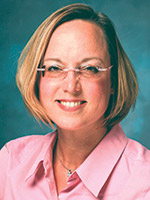Nerine Cherepy - 2016-17 SPIE Women in Optics Planner
Research Scientist, Lawrence Livermore National Laboratory, USA
 |
Country of Birth: USA citizen born abroad
|
I am fascinated with how science holds the key to both abstract and concrete explanations of many fundamental questions and how knowledge from one scientific discipline can cross over into other fields. My growth as a scientist is largely a result of the opportunities I have had to work on diverse teams alongside chemists, physicists, materials scientists, nuclear, electrical, and mechanical engineers to solve problems that always seem to require a combination of exploratory basic science and pragmatic engineering. I am currently working on developing new scintillators for ionizing radiation detection and integrating them into prototype devices. I am also exploring new phosphors for lighting. Some of them are shown in the photograph, under illumination by UV light.
I am delighted at how much more can be learned with effective teamwork—finding the right tasks for each person and employing good research strategy that engages the creativity of all team members.
A scientific career is a continuous series of projects—not all of them are successful, but useful knowledge is gained from each effort. The saying, “the harder you work, the luckier you get,” is very true. Setting ambitious goals is a good way to start, but then we must recognize the small victories along the way. We must not be deterred by small setbacks, and when we occasionally exceed our own expectations of what we thought possible, we must celebrate!
If you are considering a STEM career, ask about helping in a laboratory during your undergraduate work in order to try out hands-on research. Identify the type of research that interests you most, and seek out a mentor who can help you onto a suitable career track. While the scientific community has a higher percentage of males, women who establish themselves as equally competent to their male peers often provide somewhat different perspectives in problem solving, work style and communication methods that are valued in forming effective research teams.